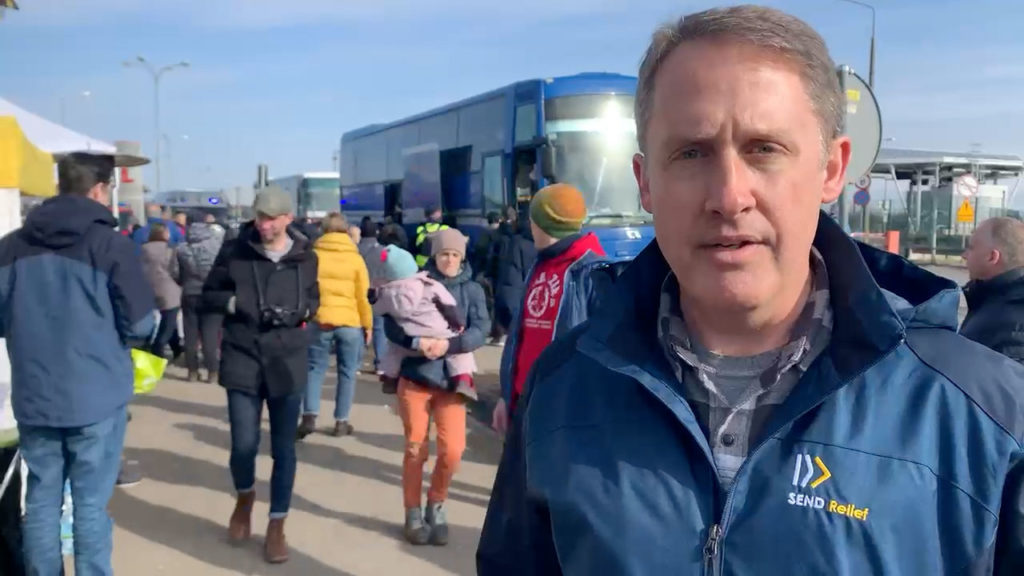Jason Cox remembers exactly where he was when news of Ukraine’s invasion broke.
As Send Relief’s VP of International Ministry, Cox was serving at a Care for Refugees workshop in Raleigh, North Carolina, when it was announced that Russian tanks and troops were moving into Ukrainian territory.
In shock and determined to help in any way possible, Cox began coordinating travel plans with International Mission Board (IMB) President Paul Chitwood and leadership teams to join them on their trip to Poland. Three short days later, Cox boarded a plane to Poland.
After reaching the borderlands, Chitwood and Cox and an IMB team, arrived at one of the main border patrol crossings out of western Ukraine. The crossing stations were fully stocked with portable toilets, kiosks of hot beverages and snacks, SIM cards for cellphones and transportation waiting for refugees.
“That’s when it became real,” Cox shared. “You see these people packed into tour buses and within a few minutes, you realize there’s no men. With few exceptions, the refugees are all women and children who were forced to leave their husbands, brothers and fathers. It was jolting to see flocks of mothers traveling alone with small babies and the elderly with their suitcases register the fact that they left the rhythms of their normal lives to come to an unknown and uncertain future. You could see the raw emotion on their faces.”
One of the only encouraging sights in this heart-wrenching scene were the parking lots filled with cars that had license plates from all over the European Union—relatives and friends waiting to volunteer to transport families to their next destination.
The kindness of strangers has been a recurring theme in surrounding countries’ response to the current crisis, and the local church, in particular, has stepped up to serve those fleeing.
One local Baptist church began partnering with Send Relief after they transformed the sanctuary into a makeshift shelter.
“I’ve never seen anything like it,” Cox said of the facility. “The sanctuary that sat a couple hundred people had no furniture left in it. Cots were lining every square inch of available space. Washing machines were moved in and constantly running laundry, and volunteers were cooking hot meals the entire day. They made sure to cook incredibly good food and extend joyous hospitality—not just keeping people alive but letting them know they are wanted and welcomed in Poland.”
At this church, Cox witnessed several indescribable moments of unity as Polish and Ukrainian believers gathered to sing hymns around a piano together—a beautiful picture of the Body of Christ choosing to worship in the face of life-altering tragedy.
Send Relief is coming alongside many of these churches to help with manpower and resources to create more sustainable solutions, as many churches and their volunteers push the limits of their capacities going into one month of managing the fallout of this crisis. We are in discussions with our partners about strategies to help churches and volunteers across 12 surrounding nations stay healthy and properly resourced.
The flow of refugees is not stopping. Those that made it out early probably had the financial means to do so, and those left behind or crossing the borders later most likely are families who don’t have much of a plan after making it to a new country or the money to move out of temporary shelters.
This is where the real concern for partners and volunteers lies now: stamina as the situation continues to unfold. But support for the Ukrainian people remains strong.
When asked how long he believed the church could continue providing for the huge influx of refugees, a Polish pastor responded, “To the end.”
And we are committed to do the same. Pray for families fleeing Ukraine, our partners on the ground and the churches receiving refugees to find the strength to continue.
If you would like to help with the ongoing crisis in Ukraine, give here today.
Published March 25, 2022
